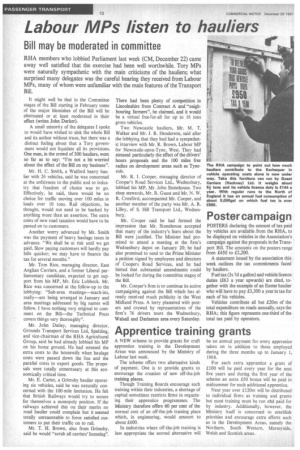Labour MPs listen to hauliers
Page 12

If you've noticed an error in this article please click here to report it so we can fix it.
Bill may be moderated in committee
RHA members who lobbied Parliament last week (CM, December 22) came away well satisfied that the exercise had been well worthwhile. Tory MPs were naturally sympathetic with the main criticisms of the hauliers; what surprised many delegates was the careful hearing they received from Labour MPs, many of whom were unfamiliar with the main features of the Transport Bill.
It might well be that in the Committee stages of the Bill starting in February some of the major blemishes of the Bill will be eliminated or at least moderated in their effect (writes John Darker).
A small minority of the delegates I spoke to would have wished to sink the whole Bill and its author without trace, but there was a distinct feeling about that a Tory government would not liquidate all its provisions. One man, in the crowd of 300 hauliers, went so far as to say: "I'm not a bit worried about the effect of the Bill on my business".
Mr. H. C. Smith, a Watford heavy haulier with 26 vehicles, said he was concerned at the unfairness to the public and to industry that freedom of choice was to go. Effectively, he said, there would be no choice for traffic moving over 100 miles in loads over 10 tons. Rail objections, he thought, would not need to be backed by anything more than an assertion. The extra costs of new road taxation would have to be passed on to customers.
Another worry advanced by Mr. Smith was the payment of heavy haulage taxes in advance. "We shall be at risk until we get paid. Slow paying customers will hardly pay bills quicker; we may have to finance the tax for several months."
Mr. Tom Rice, managing director, East Anglian Carriers, and a former Liberal parliamentary candidate, expected to get support from his MP, Mr. Eric Lubbock. Mr. Rice was concerned at the follow-up to the lobbying: "Sub-area meetings—teach-ins, really—are being -arranged in January and area meetings addressed by big names will follow. I have nothing very original to comment on the Bill—the Technical Press covers things very thoroughly".
Mr. John Dailey, managing director, Grounds Transport Services Ltd, Spalding, and vice-chairman of the RHA Agricultural Group, said he had already lobbied his MP on his home ground. He had stressed the extra costs to the housewife when haulage costs were passed down the line and the parallel costs to export goods. The proposals were totally unnecessary at this economically critical time.
Mr. E. Carter, a Grimsby haulier operating six vehicles, said he was naturally concerned with the 100-mile limitation. He felt that British Railways would try to secure for themselves a monopoly position. If the railways achieved this on their merits no road haulier could complain but it seemed totally unreasonable to force satisfied customers to put their traffic on to rail.
Mr. T. H. Brown, also from Grimsby, said he would "scrub all carriers' licensing". There had been plenty of competition in Lincolnshire from Contract A and "neighbouring farmers", he claimed, and it would be a virtual free-for-all for up to 16 tons gross vehicles.
Two Newcastle hauliers, Mr. M. T. Walker and Mr. J. R. Henderson, said after the lobbying that they had had a sympathetic interview with Mr. R. Brown, Labour MP for Newcastle-upon-Tyne, West. They had stressed particularly the effect of the drivers' hours proposals and the 100 miles free radius on development areas such as Tyneside.
Mr. R. I. Cooper, managing director of Cooper's Road Services Ltd., Wednesbury, lobbied his MP, Mr. John Stonehouse. Two shop stewards, Mr. R. Guest and Mr. N. W. R. Croxford, accompanied Mr. Cooper, and another member of the party was Mr. A. R. Lilley, of S. Hill Transport Ltd., Wednesbury.
Mr. Cooper said he had formed the impression that Mr. Stonehouse accepted that many of the industry's fears about the Bill were justified. The Minister had promised to attend a meeting at the firm's Wednesbury depot on January 20; he had also promised to send to the Prime Minister a petition signed by employees and directors of Coopers Road Services, and he had hinted that substantial amendments could be looked for during the committee stages of the Bill.
Mr. Cooper's firm is to continue its active campaigning against the Bill which has already received much publicity in the West Midland Press. A lorry plastered with posters and crewed by representatives of the firm's 76 drivers tours the Wednesbury, Walsall and Darlaston area every Saturday.












































































